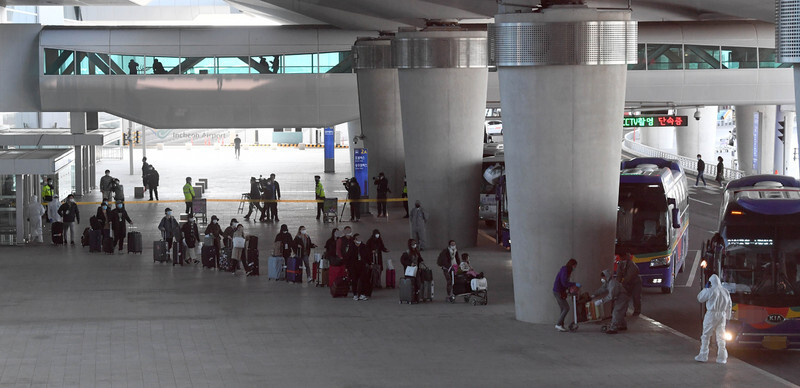hankyoreh
Links to other country sites 다른 나라 사이트 링크
Local S. Korean governments vow to test and quarantine all overseas arrivals

After South Korea implemented stronger quarantine measures on Apr. 1, requiring everyone arriving in the country from overseas to spend two weeks in self-quarantine, various local governments have been enlisting official vehicles, taxis, charter buses, and even ambulances to transport people to their quarantine locations. Some local governments have even promised to place people without symptoms in state quarantine facilities in an effort to test them all, but the central government has said it wouldn’t be feasible to apply such an approach nationwide.
South Korea’s public health authorities said on Apr. 1 that there were 55,000 arrivals from overseas in the final week of March, representing a 94% decrease over the past three months. There had been 800,000 arrivals in the first week of January. Since the government made it mandatory for arrivals from Europe to spend two weeks in self-quarantine on Mar. 22, the number of arrivals has been about 7,000 a day, with around 50 non-Koreans arriving for a short stay of 15 days or more.
With the number of arrivals, including foreigners on short stays, on the decline since the imposition of the two-week self-quarantine period, the government expects that the number of imported cases of COVID-19 will decrease as well. An analysis of cases that have occurred over the past two weeks shows that the most common mode of transmission is import from overseas, at 35%. As of Wednesday, there were 560 (including 514 Korean nationals) imported cases of COVID-19 in the country, representing 5.6% of the total caseload.
Now that self-quarantine has been made mandatory for all arrivals, local governments around the country have been putting official vehicles, taxis, and ambulances to use in transporting people to their places of quarantine. Individuals arriving from overseas who are unable to drive home from the airport in a personal vehicle are able to ride in dedicated carriages on KTX high-speed trains or in airport shuttle buses to transportation hubs around the country. To make the trip from those hubs to their homes, they’re required to use transportation options provided by their local government.
Even though only arrivals from Europe are subject to mandatory COVID-19 testing, most of the country’s local governments (with the notable exception of Busan and South Gyeongsang Province) said they’ll be preemptively testing everyone arriving from overseas. A few local governments, including the cities of Sejong, Daejeon, and Gwangju, went a step further by announcing that they’ll be transferring all arrivals, even those without symptoms, to residential treatment centers for testing. These individuals will have to remain in the centers until they receive their test results.
But the position of the central government is that these plans to first quarantine and then test everyone arriving in the country without symptoms would be difficult to apply across the board. “While tougher measures can increase safety, we need to devise reasonable measures that take into account all factors, including whether implementation is feasible given our actual administrative resources. There are clear limitations and substantial costs to adopting [preemptive quarantine followed by comprehensive testing] as the national model,” said Kim Gang-lip, first general coordinator for the Central Disaster and Safety Countermeasures Headquarters and vice minister of health and welfare,
In related news, the government is planning to run nine temporary living facilities for foreigners on short-term stays who don’t have a permanent residence in the country and to set aside additional hotels in the private sector in case those facilities run out of space. Passengers who are merely transferring through Incheon Airport won’t have to go through the domestic quarantine or immigration lines; instead, they’ll receive a basic check for fever and be allowed to wait in the departures area.
By Park Da-hae and Noh Ji-won, staff reporters
Please direct comments or questions to [english@hani.co.kr]

Editorial・opinion
![[Editorial] Intensifying US-China rivalry means Seoul must address uncertainty with Beijing sooner than later [Editorial] Intensifying US-China rivalry means Seoul must address uncertainty with Beijing sooner than later](https://flexible.img.hani.co.kr/flexible/normal/500/300/imgdb/original/2024/0517/8117159322045222.jpg) [Editorial] Intensifying US-China rivalry means Seoul must address uncertainty with Beijing sooner than later
[Editorial] Intensifying US-China rivalry means Seoul must address uncertainty with Beijing sooner than later![[Column] When ‘fairness’ means hate and violence [Column] When ‘fairness’ means hate and violence](https://flexible.img.hani.co.kr/flexible/normal/500/300/imgdb/original/2024/0516/7417158465908824.jpg) [Column] When ‘fairness’ means hate and violence
[Column] When ‘fairness’ means hate and violence- [Editorial] Yoon must stop abusing authority to shield himself from investigation
- [Column] US troop withdrawal from Korea could be the Acheson Line all over
- [Column] How to win back readers who’ve turned to YouTube for news
- [Column] Welcome to the president’s pity party
- [Editorial] Korea must respond firmly to Japan’s attempt to usurp Line
- [Editorial] Transfers of prosecutors investigating Korea’s first lady send chilling message
- [Column] Will Seoul’s ties with Moscow really recover on their own?
- [Column] Samsung’s ‘lost decade’ and Lee Jae-yong’s mismatched chopsticks
Most viewed articles
- 1Celine Song says she’s gratified global audiences have responded to the kismet of ‘inyeon’
- 2[Editorial] Transfers of prosecutors investigating Korea’s first lady send chilling message
- 3[Exclusive] Unearthed memo suggests Gwangju Uprising missing may have been cremated
- 4[Column] US troop withdrawal from Korea could be the Acheson Line all over
- 5Truth commission confirms Korean War killings by soldiers and police
- 6USFK sprayed defoliant from 1955 to 1995, new testimony suggests
- 7[Editorial] South Korean women are mobilizing in unprecedented ways
- 8Calls for gender-equality continue as demonstrations target President Moon
- 9[Column] “Hoesik” as ritual of hierarchical obedience
- 10Why Kim Jong-un is scrapping the term ‘Day of the Sun’ and toning down fanfare for predecessors